By default, File Explorer in Windows 10 does not show the file extension for most file types. You can enable file extensions for files in File Explorer options. To quickly toggle hiding or showing file extensions, you can add a special context menu entry.
Advertisеment
In Windows 10, there are some options which allow you to show or hide file extensions in File Explorer. Let's explore them all.
The first option is in the modern Ribbon interface. It has a checkbox on the View tab to toggle File name extensions.
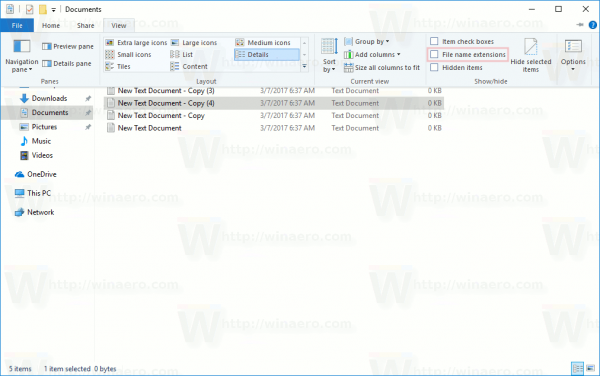
Tick the File Name Extensions checkbox and you will get them showing instantly:
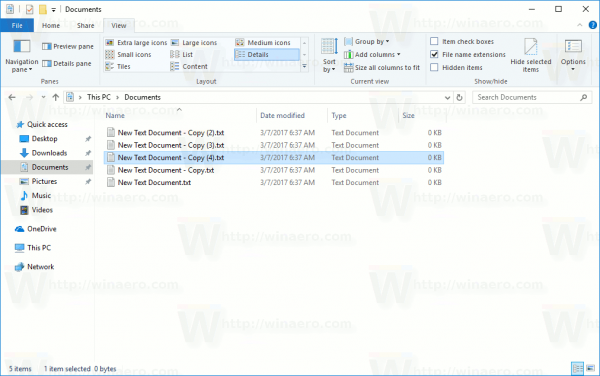
The second method is a special option in Folder Options. You can access Folder Options from the View tab of the File Explorer Ribbon. Untick the Hide extensions for known file types checkbox. The result will be the same - extensions will be turned on.
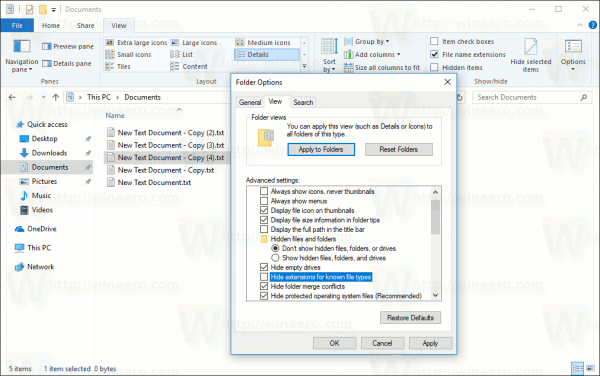
Note: You may notice that some files, like DLL files, have extensions displayed in File Explorer even if you have turned extensions off. In the screenshot below, you can see that File name extensions checkbox is unchecked, however, extensions are visible for *.dll files.
To enable or disable file extensions faster, you can add a special context menu command to File Explorer. It will be visible when you right-click on a file, folder, or folder background.
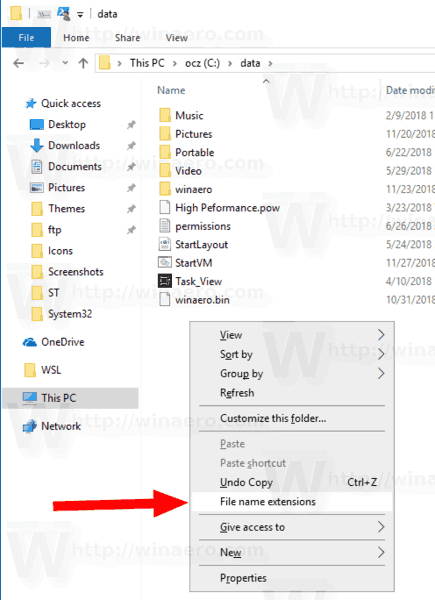
Here is how it can be done. Before proceeding, ensure that your user account has administrative privileges. Now, follow the instructions below.
To add the File Extensions context menu in Windows 10, do the following.
- Download the following ZIP archive: Download ZIP archive.
- Extract its contents to any folder. You can place the files directly to the Desktop.
- Unblock the files.
- Double click on the Add_File_Extensions_context_menu.reg file to merge it.
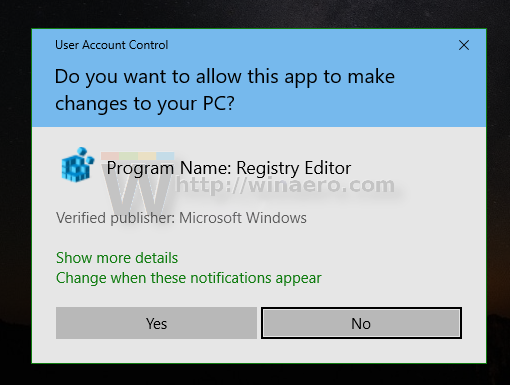
- To remove the entry from the context menu, use the provided file Remove_File _Extensions_context_menu.reg.
You are done! See the menu in action:
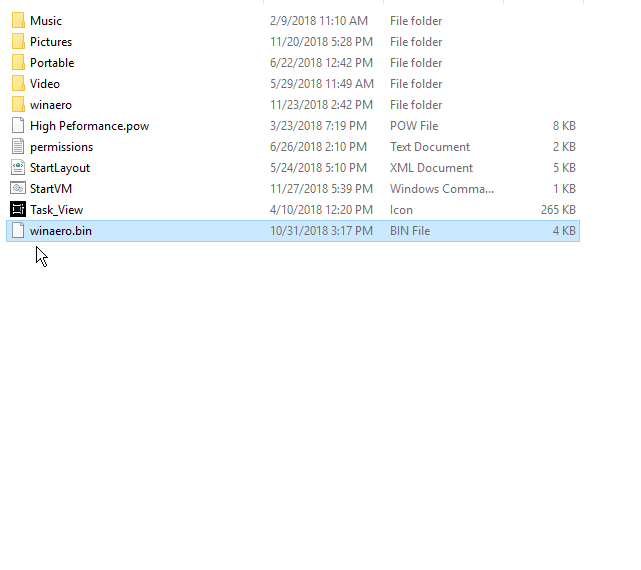
Tip: I suggest you to read the following article:
https://winaero.com/blog/show-hide-file-extensions-windows-10/
There, you will find some interesting hacks related to file extensions in File Explorer.
How it works
In our previous article, we saw how to add any Ribbon command to the Context menu in Windows 10. See
How to add any Ribbon command to the right click menu in Windows 10
In short, all the Ribbon commands are stored under the Registry key
HKEY_LOCAL_MACHINE\SOFTWARE\Microsoft\Windows\CurrentVersion\Explorer\CommandStore\shell
You can export the desired command and modify the exported *.Reg in order to add it to the context menu of files, folders, or any other object visible in File Explorer. In our case, we need the command named "Windows.ShowFileExtensions".
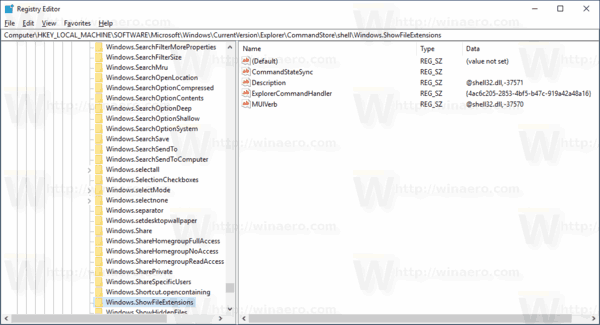
As you can see in the screenshot above, there is the Windows.ShowFileExtensions command we can use for our task.
So, the contents of the REG file is as follows:
Windows Registry Editor Version 5.00
; Created with Winaero Tweaker 0.12.1.0
; https://winaero.com[HKEY_CLASSES_ROOT\*\shell\Windows.ShowFileExtensions]
"CommandStateSync"=""
"Description"="@shell32.dll,-37571"
"ExplorerCommandHandler"="{4ac6c205-2853-4bf5-b47c-919a42a48a16}"
"MUIVerb"="@shell32.dll,-37570"[HKEY_CLASSES_ROOT\Folder\shell\Windows.ShowFileExtensions]
"CommandStateSync"=""
"Description"="@shell32.dll,-37571"
"ExplorerCommandHandler"="{4ac6c205-2853-4bf5-b47c-919a42a48a16}"
"MUIVerb"="@shell32.dll,-37570"[HKEY_CLASSES_ROOT\Directory\Background\shell\Windows.ShowFileExtensions]
"CommandStateSync"=""
"Description"="@shell32.dll,-37571"
"ExplorerCommandHandler"="{4ac6c205-2853-4bf5-b47c-919a42a48a16}"
"MUIVerb"="@shell32.dll,-37570"
Context Menu Tuner
Alternatively, you can use the Context Menu Tuner app. It will allow you to add any Ribbon command to the Library context menu.
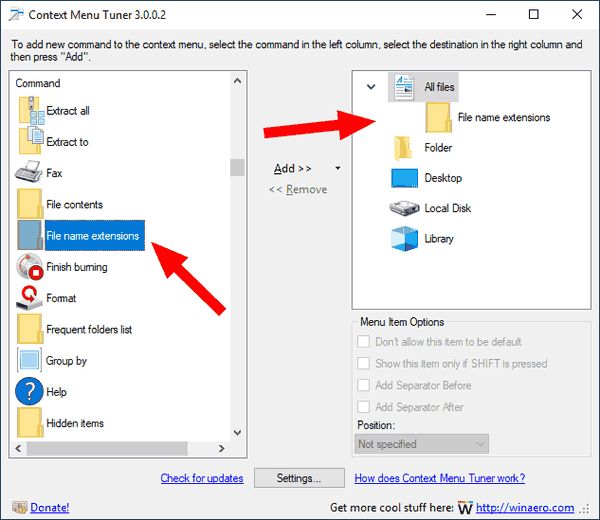
Select "File Name Extensions" in the list of available commands, select All Files in the right list and click the "Add" button. Repeat the same for the Folder item in the right pane.
You can get the app here:
That's it.
Support us
Winaero greatly relies on your support. You can help the site keep bringing you interesting and useful content and software by using these options:
